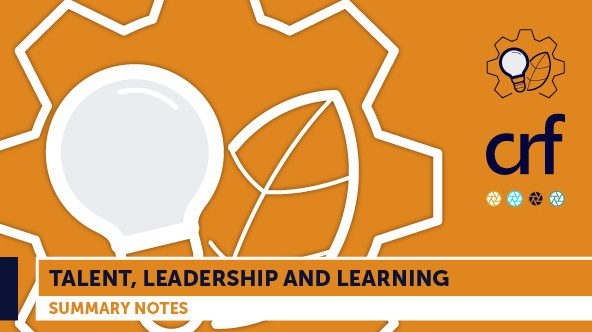Analytics and EBHR
TL&L Summary Notes: 2025 Mercer Talent Trends
On 12th March, CRF and Mercer hosted an online TLL community event discussing Mercer’s latest findings from the 2025 Global Talent Trends and 2025 Executive Outlook study reports. Kate Bravery, Global Advisory Solutions and Insights Leader, and Maura Jarvis, UK Talent & Transformation Leader, presented key insights from research based on responses from over 2,200 clients, including CEOs, CFOs and HR leaders from 16 industries and 25 geographies. These notes summarise the key takeaways from the event:
- Business Priorities and Strategic Concerns Executives enter 2025 optimistic yet cautious, setting growth expectations amid substantial challenges. CEOs and CFOs indicate that the primary risks to business growth are reskilling/upskilling to meet changing customer demands and other transformative shifts, meeting sustainability targets, responding to the impact of the longevity economy, and managing global political instability overall. HR leaders, however, emphasise the importance of talent retention, strategic workforce planning, and redesigning roles for AI and automation. Retaining critical skills, especially in the UK, remains a top strategic concern.
- Enhancing People Management and Performance with AI Improving managerial capabilities has emerged as a global priority to address executives’ concerns about workforce adaptability and productivity. Key managerial skills identified include effective goal-setting, conducting difficult conversations, and using AI to streamline performance management processes. Organisations that successfully integrate AI into these areas are better equipped to translate strategic business priorities into effective people strategies, although HR leaders acknowledge significant barriers to achieving these goals effectively.
- Realising AI’s Potential Amid Capability Gaps Mercer discussed the importance of performance management in the workplace, highlighting its role in driving productivity and adapting to changing business fundamentals. It was noted that executives are expecting productivity gains from AI although many have not yet seen the desired results. Mercer highlighted the necessity of addressing significant HR skill gaps exacerbated by the pandemic, stressing the need for organisations to enhance capabilities in managing performance and adapting workflows for successful AI integration. The discussion touched on the challenges of implementing AI and skills-powered practices, with the additional point that scaling these initiatives across the organisation is a significant challenge.
- Driving Human-Centric Productivity Organisations that reported better success in driving productivity tended to be more mature in their skills journey and were therefore able to reward critical skills and design work to enable greater productivity which led to better outcomes. These organisations were also reported to actively integrate skills development and employee wellbeing into their strategies. Mercer’s findings indicate a clear advantage in retaining and attracting talent for organisations that strategically align productivity improvements with employee experiences and reward critical skills effectively demonstrating that these practices not only attract and retain top talent but also correlate strongly with higher revenue growth. Leadership approaches that prioritise trust, equity, executive accountability and risk management further support these productivity strategies.
- Navigating Uncertainty Mercer expressed concerns about the impact of global economic turbulence on business priorities, particularly in HR. There has been a noticeable shift from optimism to a more cautious, wait-and-see approach, with reluctance to invest in discretionary spending and a potential pause in the DEI agenda. Additionally, the UK faces unique challenges such as increased costs and profitability concerns, highlighting the need for a long-term focus and maintaining trust with employees. Mercer emphasised that honest communication from leaders is crucial, ensuring that business priorities align with individual priorities and that a collective effort is necessary to navigate these challenging times.
In summary, Mercer explored current business priorities, talent initiatives, and the importance of performance management in translating these priorities into effective people strategies. The discussion concluded with insights on driving human-centric productivity, the impact of global economic turbulence on HR priorities, and the need for honest communication and collective effort in navigating challenging times.
For further insights, view Mercer’s 2025 Global Talent Trends and Executive Outlook reports.
Further Resources
Cracking the Code: Five imperatives for executive assessment success
10 ways to future proof your performance management strategy
CRF Research: Driving Organisational Performance HRs Critical Role
5 ways to improve Fair Pay and Transparency in your organisation
Value unleashed: The new rules of job architecture
Reinventing jobs for the future of work
Bridging the gap: C-Suite and HR priorities for success in 2025
Delivering the future of work at Anglo American: the CLO role
MEMBER LOGIN TO ACCESS ALL CRF CONTENT


